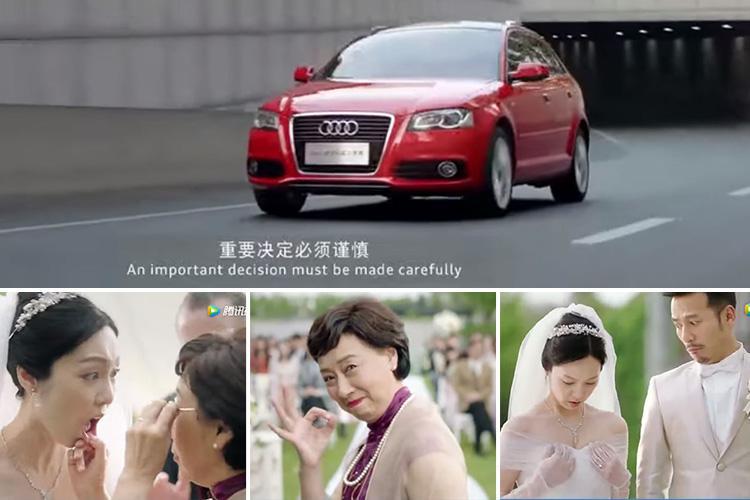As one would think that the years of advertisements that were offensive to women due to stereotypes were over, the Chinese advertisement for a new Audi proved everyone otherwise. The ad compared winding and marrying a wife to purchasing a car, stating that an “important decision must be made carefully.” The under-one-minute advertisement clip shows a happy bride and groom at the altar during their marriage ceremony. Their magical moment is abruptly intermitted by the groom’s mother stepping in and examining the bride’s nose, ears, and teeth being inspected. After the inspection, she gives the ‘ok’ sign, leaving the bride and groom seemingly relieved as the mother-in-law approved their marriage. The ad was chosen because it sparked outrage on Chinese social media and worldwide because of the severe misogyny and stereotyping

What frustrated the public the most was that the ad marketed Audi’s used car service, implying that marrying a woman is similar, if not the same, as choosing a used car. Besides, the advertisement raised questions about the Chinese culture’s stereotypes, assuming that the romantic relationships between a man and a woman are dominated by the mother-in-law, controlled by the dominant male, and strengthened by a passive female. Therefore, it is unlikely that such an ad could be approved to be released in the US or Europe, where such a stereotype would not pass the marketing board meeting.
Relationships between men and women who plan on becoming spouses come with history and baggage, and it is important to understand the characteristics of both people when ‘tying the knot.’ However, the way in which the Audi ad presents the relationship suggests that it is the woman who must be examined and scrutinized for every detail of their appearance and personality. Thus, the same way in which a man would look at a used car’s tire wear or the engine, the same way a man would look at a woman’s breasts or hair when choosing a mate. This is revealing the persistent gender stereotyping in family and romantic relationships. For example, women are not supposed to enjoy having sexual relationships, as suggested by Peggy Orenstein in her TED Talk. Gender stereotypes have worked in such a way that women see intimacy as their ‘duty,’ as if they owe their bodies to men who expect to receive all the sexual pleasure. In this context, a woman is perceived as a tool that a man can use to fulfill his desires, ranging from intercourse to having a certain status in society.
It is worthy to note that gender norms are currently undergoing some challenges, with masculinity being scrutinized and overhauled. As suggested by Zimbardo in his TED Talk, young men have begun finding it more and more difficult to engage with women and build meaningful romantic relationships with them. Thus, the portrayal of women in the Audi ad as possessions or inanimate objects, the choice of which “must be made carefully” perpetuates the challenges of men becoming more aware of the nature of romantic connections with women. It is sad to see that in the digital age when people often build connections with each other remotely, gender stereotypes persist. The exposure of the population to harmful gender stereotypes is not helpful for eliminating the issue, which creates an overall hostile environment when it comes to the transmission of social expectations.
Besides painting an unfavorable picture of wives and submissive, the Audi advertisement also shows mothers-in-law as overbearing and meddling, which is another harmful stereotype of women. There has been a persistent trope of husbands’ or boyfriends’ mothers being overprotective of their sons, intervening in their relationships with women, and sometimes reaching as far as trying to push their own ideas of the perfect daughter-in-law. This stereotype can be harmful not only to women with grown sons but also to potential girlfriends or wives-to-be who approach their mothers-in-law with caution and sometimes resentment. The Audi ad shows that a mother-in-law has the right to meddle and access the suitability of a fiancé to become her son’s spouse, and this should not have been accepted as a suitable trope in a TV ad. Even though dealing with husbands’ mothers can be a challenge, it is the stereotyping that makes matters worse for all parties involved.
To conclude, the sexist ad produced for Audi’s user car service in China perpetuated several gender stereotypes about women. Marrying someone is not just choosing someone as if they are a possession, as Audi suggested, but it takes work on a relationship and dedication. Someone’s wife is not their possession, and it is no place for anyone to assess and judge their traits. Moreover, the ad perpetuated a stereotype of a meddling mother-in-law who gets involved in the relationships between her son and his spouse. Both stereotypes are harmful to women and should not have been present in an advertisement. Moreover, the ad’s failure speaks volumes of the company’s lack of knowledge of the Chinese culture, which allowed it to issue the advertisement in the first place.